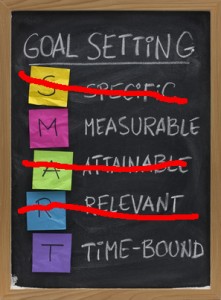
Is your life “balanced”?
If you are one of the rare people who would answer yes, then here’s a follow-up question: how long have you been “balanced” and how long do you expect it to last?
We’re told by psychologists, talk show hosts, life-coaches, and parents that we should be seeking “more balance”.
From my experience, people who are spending their time seeking a “balanced” life fall into two categories:
a) People who have not accomplished anything remarkable, and never will, because they are constantly striving for “balance” (and are thus secretly afraid that doing what it takes to achieve true success in one area will put them out of balance).
b) People who have already achieved amazing things in one (or many) areas of their lives, and are now attending to the previously ignored aspects. Better term here would be people seeking to “rebalance”.
These are two vastly different approaches to living. And I’ll argue that the second is more admirable than the first. You see,
To accomplish truly great things, you need to seek an imbalanced life.
This imbalance I’m referring to is usually temporary. And the degree of imbalance depends on your specific goals.
But make no mistake, achievement of your most important, most ambitious goals, you need to embrace imbalance.
Let’s start with a simple example, using the three corners of The Goal Triangle: family/relationships, fitness and health, and finances/career.
Imagine trying this coming month to “balance” these. If you are accustomed to goal setting, you will quickly come up with measureable, timebound goals for this month in each area. And you’ll make some progress. But will you accomplish anything truly great, without having to “borrow” time, energy, or resources from another area?
For examples, here are three truly great (in terms of ambitious) goals for 30 days:
- Fitness: Lose 10 pounds of fat without losing muscle.
- Family: Spend extra time every day with your teenage kids (or working on strategies), beyond what you are already spending, resulting in 50% fewer arguments each week.
- Finances: Perform so well in your job, through ingenuity or extra effort, that you could ask your boss in 30 days for a 5% raise and she would grant it.
Are these the “best” goals? Maybe not, but they are all examples of amazing accomplishments for a single month.
Could anyone achieve all of them at once? Not a chance. (Ok, maybe 1 out of 1000 people could; I know I couldn’t. But later in this article I’ll share how you can accomplish them all, just not in the same month.)
In fact, each one of these is so ambitious that I would argue accomplishing even one of them would be difficult.
And doing so – accomplishing just one of them – would require some sacrifices in the other areas of your Goal Triangle. If you dedicated yourself to fat loss, you’ll need to exercise more, spend more time planning your menus, extra time doing research into food and calories, and possibly even extra time meditating to get through the emotional/mental struggle involved in losing so much fat without losing muscle!
The best-case result: your family and your work are simply “maintained” at their previous level of effectiveness. The worst case: less time and energy for your family and work, either of which hurts those corners of your Goal Triangle.
In other words, for that month, you will be imbalanced.
I’ll repeat it again, knowing that I’m repeating myself: To accomplish truly great things, you need to seek an imbalanced life.
Does That Mean The Other Areas Must Suffer?
No, it doesn’t mean that the other areas must suffer. Quite possibly, you can still accomplish small things. In the example above, while focused on losing the fat, you should still able to do your job at work. You’d still spend time with your kids. You may even make a little progress on small goals in each of those areas, but that depends on how deep you need to go into the main goal (in this case, fat-loss).
The more ambitious your goal (in terms of aggressive timelines or amazing results), the more likely other areas of your life could decline.
This is “temporary imbalance in the interest of achieving something truly great.”
How Much Imbalance Is Too Much?
Depending on your main goal, you may be willing to go deep into imbalance or not so much. There is no single formula.
Stephen Covey talks about the “emotional bank account”. The basic concept is that you are always either making deposits into or withdrawals out of your life’s key areas. With work, you are either doing things to improve your skills, relationships, and performance or you are letting those things slip a bit. With your family, you are either building stronger relationships or you are straining them. Same with your fitness.
Taking relationships as a deeper example, you can miss one of your kids’ basketball games (a withdrawal from the emotional bank account) if you’ve already been to the past three games (previous deposits into the emotional bank account). You can only withdraw what you’ve deposited. If you are taking more withdrawals than you’ve made deposits, then you are in trouble. Once an account balance is negative, it not only takes much more effort to restore good standing; you may also never recover.
I’m not advocating having a negative account balance in any area of your life. So you have to stay very aware of the impacts of your chosen imbalance. If you take the imbalance too deep or for too long, you obviously have to pull back.
So how does imbalance actually result in a greater life, full of diverse areas of achievement?
The Key To Balancing Imbalance
A simple but extremely effective way to avoid too much imbalance is this:
Cycle your imbalance.
Focus on one area, intentionally being imbalanced, for a period of time. Then switch gears to a different area, while simply maintaining the gains you made in the first area.
Over time, you are actually achieving life-long balance, even though there is never a single point in time where you are balanced. Think of it as a helix, where you are cycling around but over time climbing higher and higher because you are periodically rebalancing your life.
How Often To “Rebalance”?
I like to think of most big things in longer blocks than a month. Three months works pretty well for most ambitious objectives, because it’s enough time to accomplish truly great things but short enough that less attention to the other areas won’t do too much damage. This gives you 4 really ambitious goals to accomplish each year.
But some goals may require longer periods of imbalance. If you’ve been a horrible dad for 10 years and suddenly want to be a great dad, you are going to need to make that your primary focus for much longer than 3 months, even if that means you make little to no progress on career and fitness.
And some goals could take shorter than 3 months. For example, quitting smoking.
You’re not looking for a balanced life, you’re looking to constantly shift your balance one way then another.
And the magic of this is that once you achieve an ambitious goal, it usually is long lasting with reduced effort. You focus on learning the basics of a certain language, and then maintaining your fluency is easier than the initial learning. You focus for a few months really hard on learning everything about the right way to eat, even to the point where other parts of your life become secondary, but then you have that knowledge. It doesn’t go away. It’s like an investment.
What Goals Are Worth Being Imbalanced Over?
When you’re setting a goal that feels really ambitious, ask “Is this goal really important enough to me that I’m willing to be imbalanced as I pursue it? Am I willing to somewhat neglect other areas of my life to achieve it?”
If it is truly a great, ambitious goal, then you should feel some butterflies in your stomach as you ask those questions. Achieving great things doesn’t come easily. If you don’t feel butterflies, then maybe it’s not ambitious enough to earn the description of “truly great”.
Perhaps there’s a better big, ambitious goal to pursue. One whose achievement is worth being “temporarily imbalanced”.
